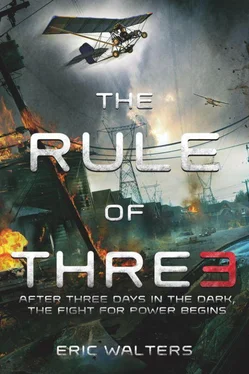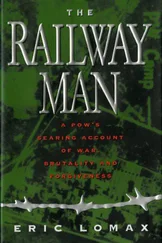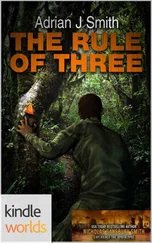* * *
Earlier today, over the course of the afternoon, she and Herb had led a caravan to remove the final items from her police station and close it down. I was one of the drivers. We moved everything from the station that might be useful. Shotguns, rifles and pistols, all the ammunition, bulletproof vests, tear gas, bullhorns and walkie-talkies, shields, batons, handcuffs, and restraints. We also took along all sensitive papers, manual typewriters, batteries, office supplies, lightbulbs, chairs, and the portable generator.
We were lucky that the four officers who were living at the station all agreed to join our neighborhood. It wasn’t hard finding them each a place to stay. Everyone Mom asked seemed happy to welcome a police officer into their household. Having a cop in the guest room probably made them feel safer.
“Are the newcomers in position?” Herb asked.
“Yes,” Mom said. “They’re on duty around the perimeter, along with the regular people at the checkpoints.”
“I know this hasn’t been easy,” Herb said.
“I never thought I’d be in charge of stripping down the station. We even took down the Stars and Stripes.”
“You took it down so that it can be put back up at the new station, once you decide where that’s going to be,” Herb said.
“When we have a station and we have a flagpole. Right now at least everything is in either your basement or mine, under lock and key.”
“You did the right thing,” I said to Mom, who looked so worried.
“It felt so wrong,” she said.
“But it is the right decision,” Herb said.
“I don’t think there was a choice. I just hope that once things are restored the authorities don’t feel that I’ve abandoned my duties,” she said.
“You could get in trouble?” I asked. I hadn’t thought of that.
“Very big trouble.”
“There is always a risk in everything,” Herb said, “but your actions will have helped to maintain lives while we hope that things are being restored. You’ve done nothing wrong, and I’ll be the first to testify to that.”
“Thank you. There’s no point in worrying about it. We have to focus on the here and now.” She scanned the room. “It looks like we have a full house.”
“Except for those looking after kids, almost without exception everybody in the neighborhood who isn’t at the checkpoints is here. They expect news, although I don’t think most of them expect what’s going to be said.”
“So you think those to whom we’ve spoken kept quiet?” she asked.
“If they didn’t, then we chose the wrong people to speak to,” Herb said.
Over the past three days my mother and Herb had had meetings with dozens of people in the community: Judge Roberts, a councilwoman, all four doctors, a lawyer, Ernie Williams from the grocery, all of the police officers, a couple of engineers, and of course the Petersons. They discussed their plan and swore them to secrecy.
They were the people whom Herb had identified as leaders. They represented the lines of authority in the community—police, government, the legal and medical systems. Herb had explained that these people needed to be included, to give them a sense of ownership, so they would support the plan. If they lent their support, then others would follow. If they had argued against the plan, or even questioned it too loudly in this group, the whole message could have crumbled. And some had argued and had to be convinced. Today they would support it.
They were all seated in the first few rows of the gym with the exception of Judge Roberts, Councilwoman Stevens, the fire chief—also in full uniform—and Dr. Morgan. These four were all seated on the little stage, facing the audience. The two vacant seats would be taken by my mother and Herb.
“Now we just have to get all these people to understand and agree with our plan,” my mother said.
“That’s one hundred percent guaranteed,” Herb said.
“I wish I felt that confident,” my mother said.
“We have to exude confidence,” Herb said. “These folks are looking not only for guidance but also for certainty. We have to be able to guarantee their safety if they agree to our plan.”
“Can you really guarantee their safety?” my mother asked.
“I can guarantee that without this plan they have no safety. We better begin.”
Herb and my mother stepped onto the little makeshift stage that had been constructed at the front and I moved over to the side of the gym. All of the seats were taken, but I didn’t want to sit down anyway because I was feeling so anxious. Herb and my mother were going to present the plan, but it was still my plan. What if I was wrong?
I looked into the audience for Lori, who was sitting with some friends from school. A couple of times our eyes had met and she had delivered one of those incredible smiles. It was just plain stupid how in the middle of all of this something like that mattered so much to me.
“Could I have your attention, please!”
My mother’s metallic, amplified voice bounced off the walls. The crowd, except for a baby crying, quieted immediately. Most of the eyes focused up front on my mother while others looked at the woman standing at the back, holding the crying baby. The baby continued wailing, and, looking embarrassed, the woman quickly walked out, and the sounds of the infant silenced as the door closed behind her.
“I want to thank you all for coming,” my mother continued. “This shouldn’t take long, and I want to reassure you that while you’re here all your homes are safe. Patrols and sentries are in place, securing the neighborhood.”
There was a spontaneous round of applause and cheering.
“In fact,” she continued, “I wish to report that we have increased security. As of one hour ago my police station and its contents have been relocated and four additional police officers have been reassigned to this neighborhood. This neighborhood is now our only priority.”
The applause came again, louder and more enthusiastically. I could see relief and joy in the faces of people as they cheered. My mother raised her hands to silence the crowd.
“It’s been fifteen days since our lives have been turned upside down—since some kind of catastrophic virus has destroyed computers and rendered all forms of technology that rely on them totally obsolete,” my mother began. “While originally we had hoped that this was localized, we are now fairly certain that this is not simply a national phenomenon but one that has probably affected the entire planet. As far as we can tell from the information we have gathered, the world has been plunged from the twenty-first to the nineteenth century.”
Even though none of this was news to anybody in the room, there was a collective wave of despairing sighs and groans that washed through the whole gym and flooded over the stage in front. Mom raised her hands again.
“While we all had hoped that this situation would be fixed quickly, it is clear that all the technology that has been rendered useless is the very technology that would have been used to solve the problem. There will be no short-term solution. In fact, it is more likely that the present situation will continue for many months.”
The noise in the audience rose louder than ever before. I was grateful she didn’t say what Herb was really thinking—that it could be years.
A man stood up. “You can’t know that it will be months!” he said. “You can’t know that it’s everywhere around the world!”
Some stood up and yelled out similar sentiments while others disagreed, and the whole thing just got louder and louder. I expected my mother to use the power of the podium and microphone to get everybody to quiet down, or for Herb to step forward, but neither happened. She let them argue back and forth until finally they ran out of steam.
Читать дальше












